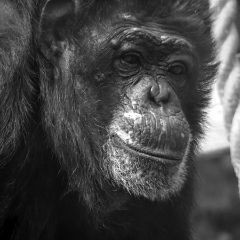SOPHIE

1976–2008
“Life’s most urgent question is: What are you doing for others?” —Martin Luther King Jr.
The first memories I have of Sophie were from her zoo home. I felt sad seeing her in that environment, and it was obvious the place had nothing to offer her. No choices, no privacy, and so much stress…Sophie was a beautiful, strong willed and charismatic chimpanzee, and I liked her very much the moment I met her. I will always regret not having the opportunity to get to know her better, but be grateful for the short time I gave her the respect she deserved.
Sophie’s story is reflected in the histories of all those chimpanzees living their lives in zoos. Sophie and three other chimpanzees were born at the Institute for Primate Studies in Norman, Oklahoma. They were then sold to the University of Montreal for child developmental studies where they would be cross-fostered for 5 years. After the study ended, they were sent to the Quebec City zoo.
These four chimpanzees, Sophie, Spock, Merlin and Maya, relied on each other and grew very close. During their first five years they lived as a family group beginning in a non-invasive, cross-fostering research study. Then, at the age of 5, they were sent to the Quebec City Zoo, in Quebec, Canada.
Nothing about their lives was normal, not the first five years, nor the years they spent on exhibit. Life in captivity is stressful, challenging, and overwhelming. As time passed, Merlin died and only three of the four were left, initiating stressful changes in the group dynamics.
The structured and invasive life of a zoo chimpanzee is difficult. To be on exhibit day after day, living with a complete lack of privacy in a controlled environment can cause a great deal of anxiety. Chimpanzees forced to live together daily, with no break from one another, never being able to relax alone in their space, suffer emotionally. If one chimp gets angry, the others must negotiate the space, often becoming fearful and submissive avoiding a fight or some consequence from the stressed individual acting out.
Although we see families of chimpanzees on exhibit and may think how wonderful it is they get to all be together, what we must also understand is that chimpanzee families, just like human families, feel stressed if they have to be together day in and day out. It is not natural for three or four adult chimpanzees to spend each and everyday together. The consequence of this kind of lifestyle include high blood pressure, stress related illnesses, aggression, or the reverse, submissive and self-abusive behaviors.
Sophie’s illnesses were stress related. She moved to Fauna in 2007 but died months later from an eight-inch ulcer that had eaten a hole in her stomach. She looked like the dominant, well-adjusted leader of the group, strong and secure in her position. But clearly something was eating away at her. She was overweight and would push the others out of the way for what she wanted. Sophie liked her time alone and she finally had that opportunity here at Fauna, although clearly it came too late.
Sophie enjoyed making her own choices, but at the zoo she was forced to sit with her hands up on the caging while she was mouth fed. There were no choices and meals were cut in pieces, carefully measured out and served to one chimp at a time while the others would watch and wait. This is so demeaning to an animal that thrives on choice and it is such an unnecessary stress, pathetic really. An adult chimpanzees being served like this and controlled in such an inappropriate way certainly led to the anxiety and stress Sophie endured daily. It would have been far better to separate the three chimpanzees and serve them their meals to eat as they wish and not have to negotiate. Food is a necessity not a luxury for a captive individual, and it must be offered freely, not negotiated for. These chimpanzees should be given meals freely and be allowed to relax and enjoy their food. It is an essential part of their day.
The lifestyle these chimpanzees were forced to live caused great frustration and angst. This is what ultimately led to Sophie’s death. Life in captivity is hard and to always be on display, deprived of ample food, or to have food withheld in exchange for items, to not have choices, and to be forced to eat whatever humans decide–all these things create worry.
Chimpanzees need quiet, they need choices, and they need respect and free will. They do not respond well to control. They will co-operate and be helpful for people who show them consideration. So many captive environments do not take into consideration the emotions of the chimpanzees nor do they understand the messages they send when we try to manipulate them. They are not ours to control, they have rights, they have desires, and they should be able to make choices. They should never have to negotiate for the basic needs in life, such as food or water. These primal needs are routinely withheld as a method of controlling all captive animals. It is wrong and it is damaging. It is indeed one of the cruelest forms of punishment that the many captive chimpanzees are subjected too daily.
I personally find it very difficult to see any captive animal without food near by. I understand the concerns of those that feel if food is always available an animal will gain weight. In our world, we have cupboards and fridges full of food, but we are not all overweight. Captivity is boring and eating is something enjoyable to do. I want to serve those I care for, and I want them to never be hungry. It is who I am, and what I believe.





